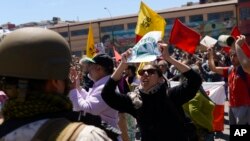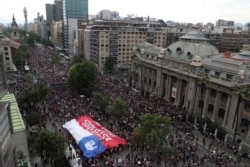Truck drivers and some public transport operators in Chile staged a strike on Friday, posing a new challenge to a government struggling to contain deadly unrest over economic hardship.
Hundreds of trucks drove slowly on a main highway that skirts the capital of Santiago, where stone-throwing protesters have fought riot police for more than a week. Some Chileans in cars and motorcycles joined the protest, held to demand an end to private highway tolls.
Violence also broke out in the port of Valparaiso, a scene of daily clashes. Thousands demonstrated in other parts of the country of 18 million.
At least 19 people have died in the turmoil that has swept the South American nation. The unrest began as a protest over a 4-cent increase in subway fares and soon morphed into a larger movement over growing inequality in one of Latin America's wealthiest countries.
The lack of leaders and a list of clear demands in the protest movement show the shortcomings of Chile's unpopular, discredited political parties, said Marta Lagos, head of Latinobarometro, a non-profit survey group in Chile.
"There is a failure of the system of political parties in its ability to represent society," Lagos said.
She said she expected protesters to become more organized, and that it was unlikely that President Sebastian Pinera, who took office last year, would resign.
Pinera served an earlier term as president, from 2010 to 2014.
The protests on Friday indicated continuing dissatisfaction among many Chileans who think economic concessions announced by the government this week don't go far enough.
Most car drivers pay between $35 and $130 a month to use highways around Santiago, depending on how much time they spend on the roads. Truckers pay much more because of the long distances that they travel.
Many Chileans earn between $560 and $760 a month, making it hard to pay for basic needs, let alone drive on the highways.
There will be no further highway toll fee increases this year under Chilean law, Transport Minister Rafael Moreno said.
Operators of some subway lines in Santiago also stopped service, further disrupting a transport network affected by burning and vandalism of stations in some parts of the city.
About 40 percent of Santiago's metro was functioning on Friday, though several thousand buses have been deployed in an attempt to make up for the disruption.
Struggling to contain the strife, President Sebastian Pinera's administration announced increases in the minimum wage and the lowest state pensions, rolled back the subway fare increase and put a 9.2% increase in electricity prices on hold until the end of next year.
Flanked by elderly Chileans, Pinera on Friday signed a measure that would raise minimum pensions of $150 by 20%, an increase that would benefit an estimated 600,000 people.
Most of the demonstrations have been peaceful, but instances of arson, looting and alleged brutality by security forces have shocked many in a nation known for relative stability.
Clashes broke out again in Valparaiso, where police used tear gas to disperse hundreds of protesters heading toward the congress building.
Members of congress and administrative staff were evacuated from the building as masked youths threw stones at security forces.






